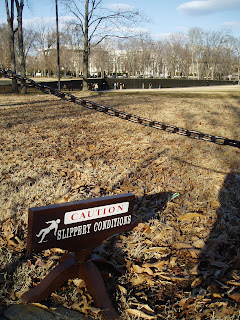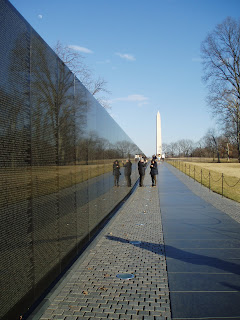[UPDATED WITH PUB DATE ON MCGINNISS BOOK]
 [UPDATED 2-24]
[UPDATED 2-24]Joe McGinniss wrote a terrific book about Alaska,
"Going to Extremes," which was published in 1980 and is still an excellent travel memoir, full of wonderfully observed insights.
More recently, McGinniss returned to Alaska, renting a house next door to the Palin family lakefront residence in Wasilla for a few months last year while he was doing research on his biography of Sarah Palin, which will be published sometime this year by Broadway Books. (The publication date hasn't been announced yet).
Palin famously yowled in protest about McGinniss's proximity to the homestead, implying that he was a peeping tom. McGinniss's proximity to the people in Wasilla who are familiar with Palin's dirty laundry was, of course, more to the point. Obviously, the much-anticipated McGinniss biography won't be favorable toward the former part-term Alaska governor and 2008 Republican vice presidential candidate.
But while we await McGinniss's book, here comes a new wave of weirdness from Wasilla, with reports that one Frank Bailey, a former top aide to Palin, has written a 500-page biography/expose of her that, interestingly, does not yet have an actual publisher. This would-be book, with the unwieldy working title "
Blind Allegiance to Sarah Palin: A Memoir Of Our Tumultuous Years," has also acquired two co-authors (read: rewrite doctors) in its long quest to find a publisher. Bailey, incidentally, describes himself as a "Fox News conservative," whatever that is supposed to convey.
But now, suddenly, the mystery manuscript has been leaked and is getting publicity. The authors and the literary agent shopping the manuscript to publishers profess to be shocked and horrified at the disclosure. The Anchorage Daily News has the
most detailed account of this latest set of Alaska shenanigans, as currently understood, that is.
Two things:
1. I haven't seen the leaked manuscript, but the excerpts and bullet points that have been noted by the Alaska newspaper and other media that have the manuscript seem to suggest why publishers have not jumped to sign up this book. Basically, the excerpts rehash some Alaska campaign violation charges and that long-ago-digested scandal over the firing of a state trooper who had run afoul of the Palin clan. And, oh yeah, it seems that Sarah Palin can become very, very cross when she feels she has been slighted or denied a benefit.
[UPDATE, 2-24]: On the other hand, the Anchorage Daily News seems to have done a lousy job of excerpting the manuscript it had in its hands. Subsequent reports on the manuscript are a little juicier and could in fact persuade a publisher to go with it.
2. The Anchorage Daily News strangely discloses that one copy of several copies of the manuscript it obtained had been sent to it by none other than McGinniss himself. The newspaper says, "The Daily News received copies from multiple sources, the first from author Joe McGinniss, who is working on his own Palin book. McGinniss didn't respond to a message asking where he obtained the manuscript and the reason he circulated it."
(Nor has the Anchorage Daily News addressed under which specific conditions it obtained the various leaked copies, whether the newspaper has violated any conditions in identifying McGinniss as a source, or whether it might feel a journalistic imperative to publicly disclose who
else leaked the goods to the paper -- but that's another matter entirely.)
What to make of all this? Well, as usual, those who are suspicious must ask
cui bono? To whose benefit does this accrue?
I have admired Joe McGinniss since he was a merrily provocative city columnist on the old Annenberg-owned Philadelphia Inquirer, driving poor Walter Annenberg nuts while Walter was trying to stifle dissent, punish enemies, sell his discredited newspaper, and get himself taken seriously as the new Nixon-appointed ambassador to Britain. Happily, Annenberg did sell the Inquirer to quality new owners in 1970, a few years after McGinniss left to write his first book, "
The Selling of the President 1968."By the way, I also have had some very minor personal experience as an author of a timely and carefully researched non-fiction book who has suddenly become aware that a cheap, quickie competitive book is likely to be on the market first. This has in fact happened to me twice, and in both cases my books' prospects were seriously damaged by the sudden appearance of quickie clip-jobs on the same newsy topic that hit the market a few months before mine did.
As regards the marketing of the McGinniss book, it also has to be a consideration by author and/or editor and/or publisher alike that Sarah Palin's popularity is on the wane, that a once potentially formidable candidate for the Republican nomination for president in 2012 has been fast losing steam, while derision directed toward her grows even in conservative ranks.
Incidentally, there's no mystery to me about how the Bailey manuscript got out. When a manuscript on a timely, probably marketable topic is shopped around, agent to publisher to publisher, copies are made and dispersed by insiders with varying motives.
My guess here is we have colliding dynamics. An inferior, limp Palin book is being shopped (and hyped, through clever media-stunt placement), to obtain a publisher and then get the book into play fast, even as interest in Palin may be waning. Coming the other way is McGinniss' superior, serious Palin book, with no publication date yet announced -- a book whose marketability is potentially affected by a competitor in a specific time frame. And waiting round the corner, maybe, is the wreck of the Palin phenomenon itself.
Among many questions: Does the leaked manuscript of a junk Palin bio also have the effect of jump-starting publication and/or marketing of the quality McGinniss bio sooner this year, rather than later?
[UPDATE: The McGinniss book now has a publication date: It's being rushed out for September.]Meanwhile,
here's a post on the leak situation by one of the putative co-authors of the Bailey book, Jeanne Devon, who writes The Mudflats, an Alaska-based blog that is often critical of Palin. And here's a
post describing himself by the other putative co-author, Ken Morris.
So many possible agendas, you could write a mystery novel.
###













